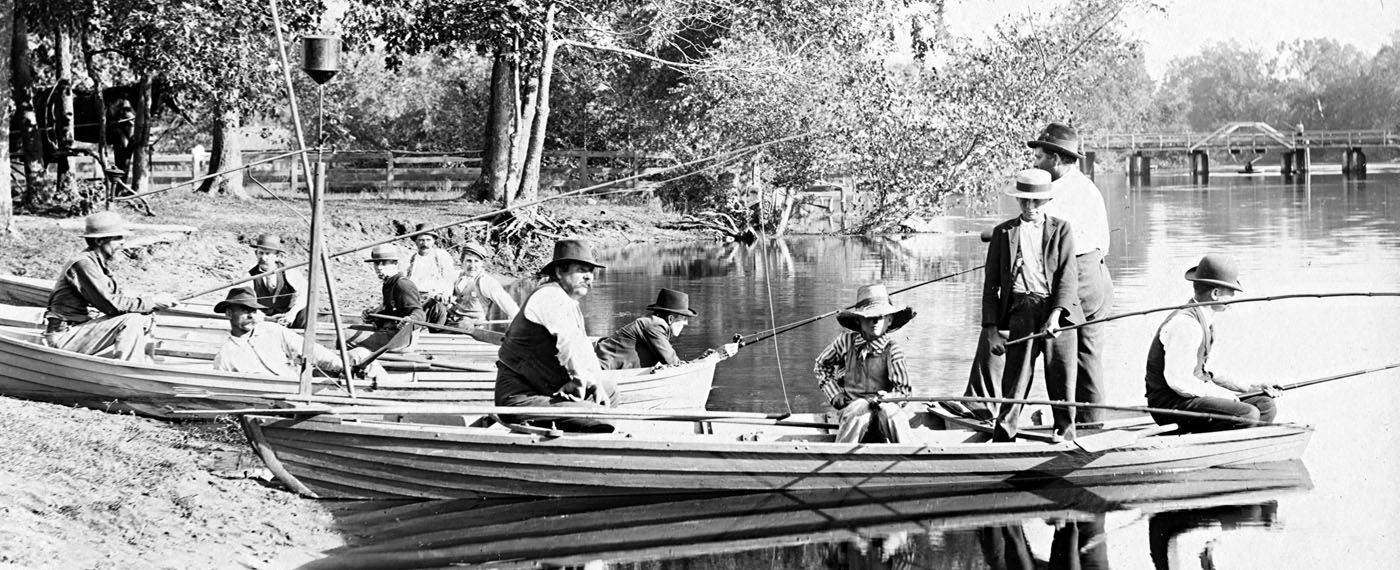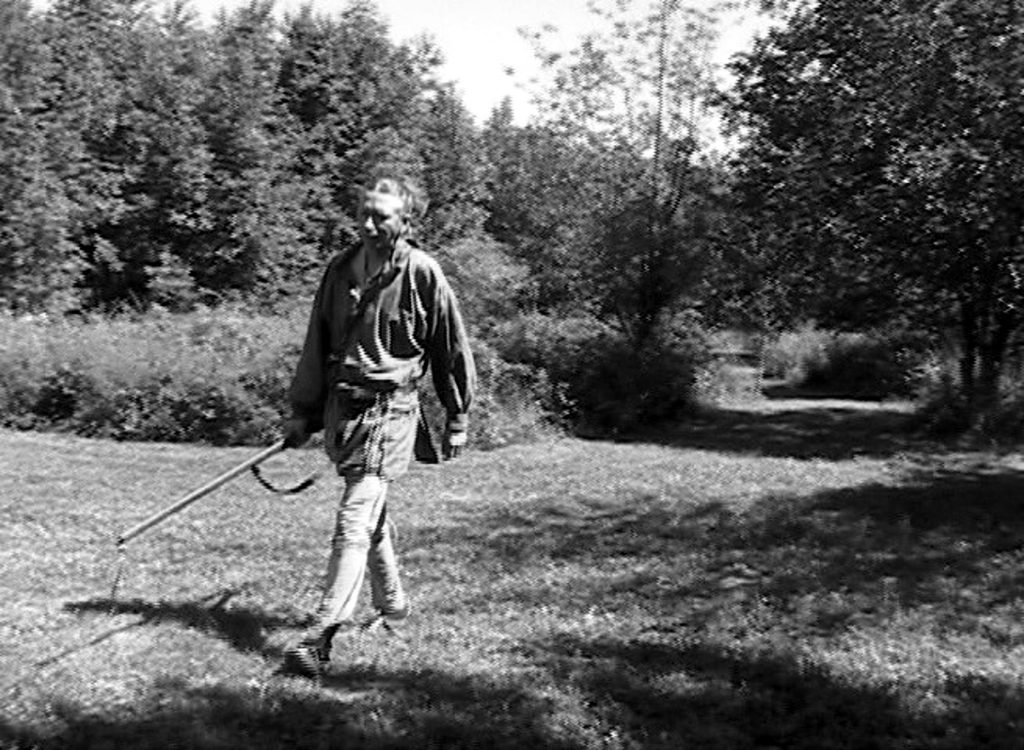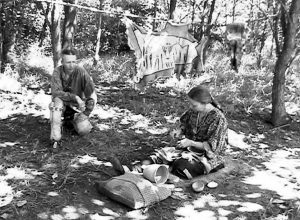Pioneer Hunters of the Kankakee
The Pottowattomie
by J, Lorenzo Werich
The readers remember that in a previous chapter I mentioned that a few of the Pottowattomie Indians were permitted to remain. Now I will tell you what became of Mingo, the little Indian boy. One of the most wonderful stories of all is a prairie on fire, which is one of the grandest sights in the world. I have seen, in the fall of the year in a dry time, the Kankakee Prairies on fire, the time of the sear and yellow leaf when all nature is about to put off her garb of green and put on the white-snow. The Indians sometimes would set the grass on fire to drive the game out. If there is any wind going It sweeps like a mighty hurricane and carries everything before it. Sometimes you can burn the grass around you and escape before the raging billows of fire reach you. “One time many years ago,” says an old hunter, “Aubbeenaubbee and Mingo, an Indian boy, and myself, were out hunting in the tall grass and weeds on the marshes about two miles from the river. We had killed a deer and had just cut it open and taken out its entrails and were preparing to skin it and cut it up so that we could carry it home, when we. heard a roaring and crackling noise west of us like the coming of a mighty storm. Aubbeenaubbee, with terror despicted on his face, said that the prairie was on fire and that we must get out. As the wind was blowing hard from that direction, we knew that it would soon be upon us and we knew that there was no salvation for Mingo in the tall grass as he was small. In the twinkling of an eye we opened out the deer and shoved Mingo in and then closed it up like a clam. Aubbeenaubbee and I then broke and ran for our lives and of all the running and tumbling and summersaults in the tall grass beat the world and all the rest of mankind. I took a straight shoot for the river but Aubbeenaubbee took off to the left of me and reached the pond or slough with some water and musk-rat houses in it and he rushed in and hurriedly tore off the top of an Id musk-rat house and jumped in and was saved. After running hard and being almost given out of being overtaken by the fire I reached a creek near the river where there was some water. I crossed over and was safe on the other side of the Jordan. Then I stood with wonder and amazement at the glorious sight of the ocean of fire rolling by and some deer and wolves rushed by me in their fright to escape the scorching elements. But I paid no attention to them. After the fire had passed by it had left nothing but a blackened pall. I started to find my companions and found Aubbeenaubbee with his head stuck out of a musk-rat house, all right except a little scorched about the head. rut he was glad to get off with that. He crawled out of the old musk-rat house and started to look for Mingo as we had great fear for him, fearing that he had been roasted alive. We found the roasted deer and knocked at the door and to our great delight Mingo called out, ‘Sit down you are at the right door” And we opened the deer and behold, he was safe and sound, although he said it was red-hot for him for a short time. The deer was roasted to a nice brown on the outside and we sat down and made a square meal off of him. Then we cut it up and carried it home and we had enough to eat for sometime without cooking.”
The finest bill of fare that I ever saw was to pass over the burnt district just after a big fire had passed and you could find all kinds of game; coon, rabbits, and sometimes prairie chickens and ducks, nicely roasted and many a meal have I made of them when out hunting and hungry. I will tell you how the Indians cooked their meats and the way they roast a deer head. It is the finest and most delicious in the world. They dig a hole about a foot square and about a foot deep and make a hot fire in it and Keep it burning until it is nearly full of red-hot coals. Then scrape out the coals and ashes. Wrap the deer head with the skin on in wet leaves and place it in the hole and cover it up with the hot ashes and coals and leave it until it is roasted through, then take it out and the skin will peel off and leave a clean, tender meat. Brains and tongue are all nicely cooked and that throws whale tongue in the shade. You can cook fish just caught in the same way. You wrap the fish in a wet paper of any kind and lay the fish down and cover it up with hot ashes and coals just as you would a roast potato in the ashes. After it is done take it out and the paper and skin peels off and leaves the juicy meat for you to place your pepper and salt and eat it. It is the finest thing in the world. You just try it sometime when you are out camping on the Kankakee and you will never get tired of it.
One time on the Kankakee we were out fishing for pike and in those days, we had no such fishing outfits as are used at the present time, such as skinners, trolling hook or Johnson grabbers or Hildebrandt’s spinner and many other patented fishing hooks and artificial baits. We had to make our lines and hooks in those days and in fishing for pike or pickerel in the Kankakee we had to have strong lines and stout hooks and bait with a big finn of one of the fish caught. If you haven’t such a bait use a large frog or minnow and keep it moving, as a pickerel seldom bites at a still bait but always takes it on the wing and go for it like lightning and splashes water in your face like a flying sea horse. Then we would pull them in out of the water. One day we caught nine pickerel that measured altogether fifteen feet. We cooked them all up for supper and with bread and butter and coffee the nine of us ate them all up and all of us laid it beat the world and all the rest of mankind. Just think! Nine men eating fifteen feet of fish. Another time we were fishing on the Kankakee and caught many red-horse, buffalo, and suckers. We ate so many fish that some of the boys could not change their shirts for three or four weeks. Now all old hunters and fishermen know that suckers and red-horse are a very bony fish but just as good as any and some like them best, only they are so full of bones. I will tell you how we fixed them, and they were alright. Take a sucker and clean it nicely, then lay it on the stump or log and with a sharp knife cut it cross-ways into pieces about an eighth of an inch long stick the pieces together with cornmeal and fry. It is alright and the bones will not trouble you or get crossways in your throat. And at that they are far better than German carp. One time we were fishing and caught a lot of carp when some guy came along and gave his idea and directions as to planking carp. Mis directions were: Get a nice big carp and clean it in good shape. Put it on a hardwood plank, salt and pepper it well, then spread a layer of butter on the top. Cover this with strips of bacon and cornmeal. Slip him in a hot oven and when done to a brown take the outfit back of the shanty and throw the fish away and eat the board. I’ll say that baked suckers and trimmings you will find more palatable than any hard wood board or carp. I will assure you that. If none of these dishes don’t appeal to you especially, just try something else.
Many years ago, but to be exact, it was the cold winter of I843 and the coldest winter ever known, there was a party of deer hunters camping on the Ridge. The snow was very deep and the weather so cold that it was almost impossible to get out and hunt for game. The ice in the river was so thick that they could not cut a hole through it with an axe so they pulled a lot old logs on the ice and set them on fire to melt a hole through it. After a night and a part of a day they got a hole through it and all kinds of fish, pickerel, bass, salmon, and even snapping turtles bounded out of the ice and they had fish to last them until the weather moderated One old snapping turtle that came out was so large that when they dressed and cooked it, it made soup enough to last them a week. The ice did not break up that Spring until away in April. Some hunters crossed the river on the ice seventeenth of April that Spring.
I will tell you now of some of the Indians that were left on the Kankakee and what became of little Mingo, the Indian boy. Mingo was the last Pottowattomie on the Kankakee. Me had been captured by the Sioux and carried away to the Northwest. The old chief, the father of Niagara, did not like Mingo and was not inclined to confer the honor on him he had so fairly made, Niagara was his favorite child and she must be the wife of some distinguished personage. But the old chief was doomed to be outwitted by his daughter as many a father is in matters of this kind. At a time when the chief was absent holding a council with a neighborhood tribes of Sioux, Mingo picked out two of the chief’s best horses on which to escape with his girl to his own tribe. Niagara was ready and when the village was sunk into profound sleep she met him in a sequestered place, bringing a supply of provisions for the trip. In a moment they were in their saddles and away. They were not less than three long sleeps from his own people and would be followed by the Indians as long as there were any hopes of overtaking them. By morning, however, there would be a wide space between them and their pursuers and would make their escape entirely practicable if no mishaps should befall them on the way. The first night or next day in the evening they reached a camp of trappers and hunters and among them were old Kill-buck and LaBonta, Frenchmen who were trapping and buying furs, and from whom I obtained this narrative while camped on the Kankakee many years. The trappers were very much surprised to see two young Indians, a young man and a squaw, ride up and alight in the midst of them, apparently much fatigued and way worn. Their presence required a prompt explanation, as they might belong to some meanders in that vicinity, who might give trouble. The young Indian made the pretext of friendship, but he might be the spy of a hostile band who were meditating an attack on them, but what means this pretty young girl who is with him. War parties are never encumbered with women and the faded condition of their horses to some extent allayed their fears, as it was evidence that they were on a long and severe journey. Old Kill-buck interrogated him as to his object and destination and learned that he was a Pottowattomie and a remnant of the tribe of the Kankakee and Wabash Rivers, and who had been taken captive about a year before by the Sioux, and was carried away by them to their villages up in the northwest until a chance to escape to his own tribe presented itself. The young girl with him was Sioux, for whom he conceived a fondness while among her tribe. The attachment was not only mutual but that they might consumate their bliss they found it necessary to elope. They were now flying to his native village to which another night’s ride he thought would bring them. As they seemed very much fatigued and were out of provisions, the party very promptly tendered them the best they had which was consumed with good relish by the two lovers, and after they had enjoyed a little repose Kill-buck drew from them the incident and story just related. The trappers tried to persuade them to stay until morning and enjoy the refreshments and rest which they needed so much, but he replied that they had not slept any since they set out on their flight, nor did they even dare to think of closing their eyes before he should reach his own home. He knew that he would be pursued as long as there was the faintest hope of being overtaken and he also knew what his doom would be if he again fell into the hands of the Sioux. Having remained in the camp a short time, the two fugitive lovers were again on the wing flying over the green prairies of the Kankakee marshes by the light of the moon. A full and beautiful moon animated and sustained by the purity of their motive, and the hope of soon reaching a place of safety and protection. They said they had good horses, good hearts, good weather, good country to travel over and above all a good cause and why not good luck. Kill-buck learned afterwards that they reached his home in safety and lived happily for many years. And that was the last that was ever heard of Mingo Doranto, the last of the Pottowattomies.
Lenia Leota, his sister, was taken captive by some other hostile Indians and carried off to the far west toward the sunset and her fate was never known nor never will be until the great day of judgment. But like the stars that shed their glory ore a dark and troubled sea, like some long-forgotten story cherished are thou still to me. There were two or three other Indians that lived and hunted and trapped on the river. One old Indian, Sheubana, lived on French Island and he was related to old Peashaway, who for many years lived on an island in the north marsh near the Cumberland lodge. Sheubana and Peashaway lived on the head waters of the Kankakee near English Lake. When I last heard of them, the three Indians mentioned were the last of the Pottowattomies on the Kankakee.



